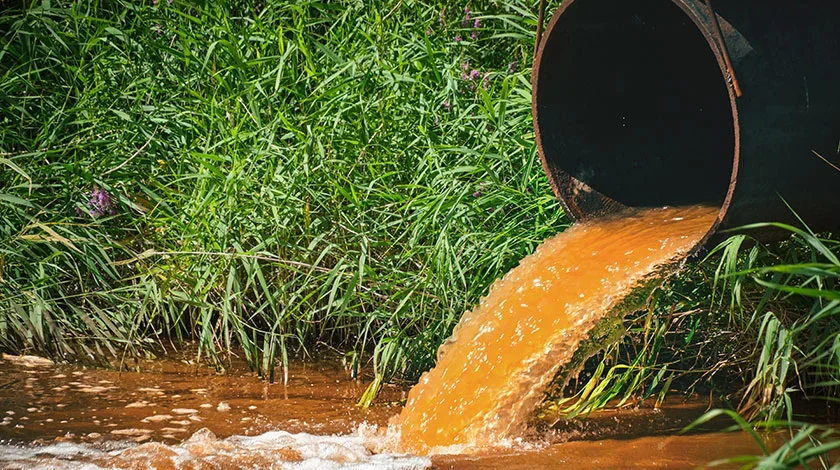The offence of water pollution in the Protection of the Environment Operations Act 1997 (NSW) is so broad that almost anyone could be issued a $30,000 on-the-spot fine for breaching it.
Manufacturers, builders and developers need to be especially careful, as runoff of even benign material like sand or soil can lead to pollution and attract penalties of more than $2,000,000.
What is water pollution?
Under section 120(2) of the Act, it’s an offence to cause or permit any waters to be polluted.
The term ‘waters’ is not limited to lakes, streams or oceans, but could be any natural or manmade watercourse, including stormwater drains or sewerage pipes.
The offence is not limited to the common meaning of pollution. The word ‘pollute’ in section 120 is defined so broadly that it includes the addition of any matter whatsoever into waters if that matter changes the state of that water. This includes things like soil, leaves, motor oil, coffee grounds, or litter.
Schedule 5 of the Protection of the Environment Operations (General) Regulation 2022 (NSW) provides a comprehensive list of what constitutes ‘matter’, and includes almost any material whether solid, liquid or gas. It specifically includes wash-off or spoil from industrial, agricultural or commercial activities.
Even if a person doesn’t actively pollute water, failing to prevent material from being washed into waters by rainfall can still amount to a breach of section 120. Accidental discharges, such as sediment runoff caused by rain, can trigger regulatory action and costly penalties.
Given the breadth of these definitions, it might seem that any person using a bathroom or kitchen would inevitably breach section 120. Fortunately, Regulation 86 excludes discharges into sewerage systems that are lawfully approved by a sewer authority such as Sydney Water.
So, using a bathroom in NSW is unlikely to result in a fine. However, sewer authorities have made it clear that only soap, detergent and water are safe to put down the sink. As a result, anyone who has washed food stuffs, cooking oil or coffee grounds down a sink, or allowed motor oil, litter or even leaves to find their way into a sewer, may have breached section 120.
Penalties
Section 123 of the Act sets a maximum penalty of $2,000,000 for corporations, with additional fines of up to $240,000 per day for continuing offences. These penalties reflect how seriously water pollution is treated under NSW law.
Practical example – ADCO Constructions Pty Ltd (2024)
The NSW Environment Protection Authority (EPA) fined ADCO Constructions Pty Ltd $30,000 after sediment-laden water was observed flowing from The Forest High School construction site into the local stormwater system, which connects to Curl Curl Creek.
EPA officers noted that proper controls were missing and that ADCO had previously been warned about sediment management. The EPA stressed the impact of sediment on aquatic ecosystems and the importance of preventative measures.
What to do if you receive a fine or notice
If you receive a penalty notice for a water pollution offence, several options are available:
Request a review
You can apply for an internal review through the NSW Government portal. Providing supporting evidence such as site records or mitigation efforts may help your case.
Elect to go to court
If you disagree with the fine, you may choose to have the matter heard in court. This must be done online prior to the deadline listed on your notice.
Always seek legal advice before electing to go to court. A court may overturn the fine, but it can also impose much higher penalties than those in the original notice.
Clean-up and prevention notices
In addition to fines, the EPA or local council may issue legally binding notices requiring you to remediate pollution or upgrade site controls. These are enforceable and can involve strict deadlines.
Key lessons for manufacturers, builders and developers
Water pollution offences aren’t limited to large spills – minor oversights can still lead to on-the-spot fines of $30,000.
To reduce your risk:
- Install and maintain effective sediment controls.
- Train employees and subcontractors on securing materials.
- Create and monitor wastewater management systems.
- Monitor weather forecasts and act early to prevent stormwater runoff.
- Keep records of inspections, maintenance, and training – these can support your defence if an incident occurs.
- Respond quickly to warnings or notices from regulators. Proactive cooperation may reduce your risk.
Need help with a pollution fine or notice?
If you’ve received a notice or fine, or if your site is under investigation, early legal advice is essential.
Coleman Greig’s building and construction experts can help you understand your obligations, respond to regulators, and reduce your risk of penalties. Contact us today to discuss your situation confidentially.














